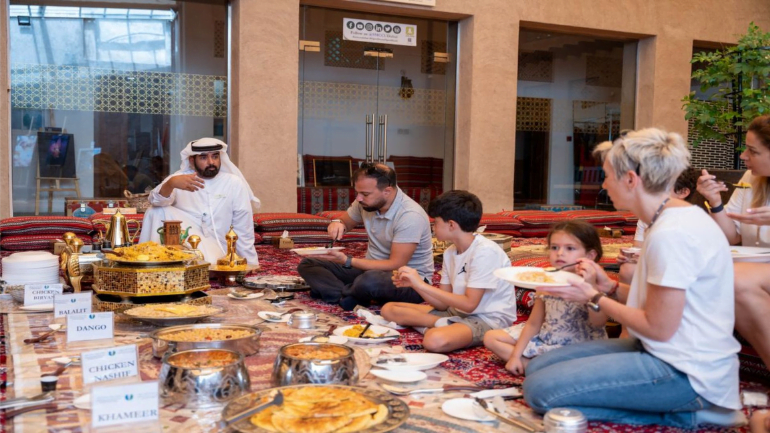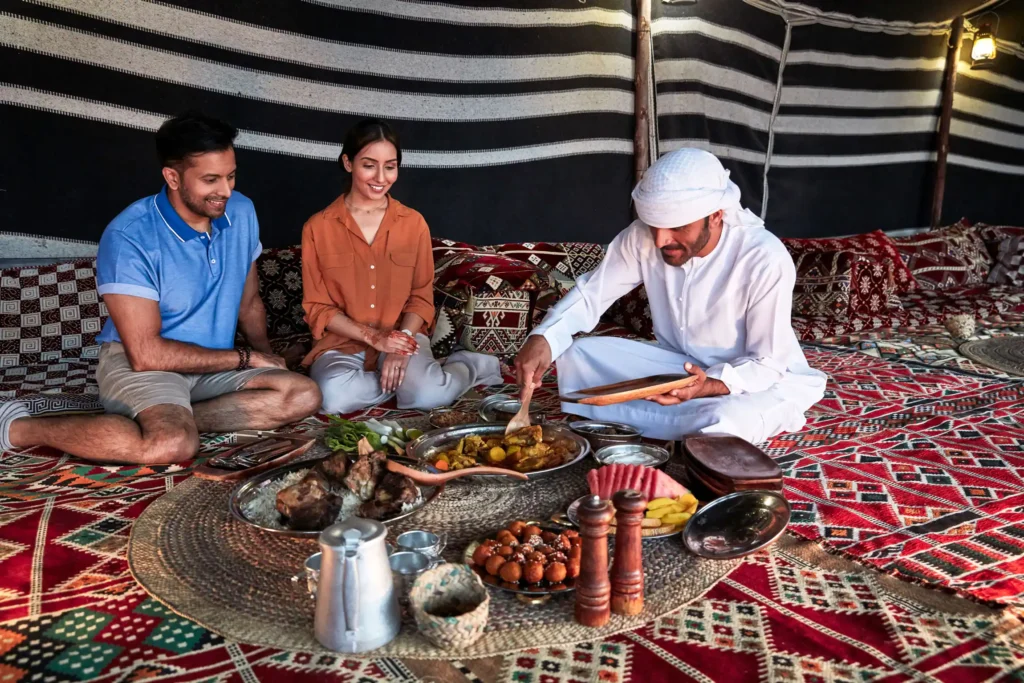Emirati hospitality is famous for its warmth and generosity. When visiting the United Arab Emirates (UAE), experiencing traditional Emirati dining is a delightful way to understand the local culture. From sharing meals with loved ones to observing dining customs, every aspect of Emirati hospitality reflects respect and community.
If you’re invited to an Emirati home or attend a traditional gathering, it’s helpful to know the customs and etiquette that locals value. This guide will walk you through the essential dining practices so you can enjoy the experience with confidence.

1. The Importance of Hospitality in Emirati Culture
Hospitality is a cornerstone of Emirati culture. Offering food and drink to guests is considered an honor, and hosts go out of their way to make visitors feel comfortable. The concept of “karam” (generosity) is deeply ingrained in social traditions. When invited to a meal, it’s not just about enjoying the food; it’s about sharing stories, laughter, and warmth.

2. Arriving at an Emirati Home
When visiting an Emirati home, it is polite to dress modestly, showing respect for the culture. Women often wear abayas or dresses, while men may wear kanduras. As a guest, a simple and elegant outfit is appreciated.
Upon arrival, greet your host with a warm “As-salamu alaykum” (peace be upon you). Handshakes are common, but wait for cues from your host, especially when greeting someone of the opposite gender.
3. Traditional Seating Arrangements
Many Emirati families prefer traditional seating on carpets or low cushions, known as “majlis.” Shoes are usually removed before entering these areas. Guests are often seated in a place of honor, reflecting the host’s respect.
The dining setup typically involves a large communal platter called a “thareed” or “machboos,” placed in the center. Sharing food from the same platter symbolizes unity and hospitality.
4. Dining Etiquette and Customs

Washing Hands Before and After Meals
Before the meal begins, it’s customary to wash your hands. Many homes provide a small basin or water pitcher for guests to cleanse their hands. Washing hands again after the meal is also common.
Eating with the Right Hand
In Emirati culture, eating with the right hand is considered polite. The left hand is traditionally reserved for other tasks. If you’re left-handed, using utensils is perfectly acceptable.
Accepting and Offering Food
When food is offered, accept it graciously. Even if you are full, it’s respectful to sample the dishes to show appreciation. Complimenting the host on the meal is always welcomed.
Guests may also be encouraged to eat more, as it’s a sign of the host’s generosity. It’s perfectly fine to decline politely when you are full.
5. Emirati Dishes You Might Encounter
Traditional Emirati meals are flavorful and often feature rice, meat, and fragrant spices. Some popular dishes include:
- Machboos: A spiced rice dish with chicken, lamb, or fish, similar to biryani.
- Harees: A creamy wheat and meat porridge, commonly enjoyed during Ramadan.
- Majboos: Tender meat slow-cooked with fragrant rice and aromatic spices.
- Luqaimat: Sweet, fried dumplings drizzled with date syrup.
Dates and Arabic coffee, known as “Gahwa”, are often served at the beginning and end of meals. Gahwa is typically poured from a traditional pot called a “Dallah” into small cups without handles. Accepting at least one cup is polite, but shaking your cup from side to side indicates that you’ve had enough.
6. Respecting Cultural Norms
While enjoying a traditional meal, remember a few cultural norms:
- Avoid wasting food, as it is considered disrespectful.
- Refrain from using your mobile phone excessively at the dining table.
- Respect any gender-specific seating arrangements, especially during large gatherings.
- Express gratitude by saying “Shukran” (thank you) after the meal.
7. Final Thoughts
Experiencing Emirati hospitality is a unique and memorable experience. By following these simple dining etiquettes, you will not only enjoy delicious meals but also build meaningful connections with your hosts. Remember, it’s not just about the food – it’s about sharing stories, laughter, and kindness.
Also read: Why Henna Art is a Must-Have at Every Emirati Celebration













